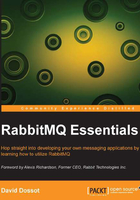
上QQ阅读APP看书,第一时间看更新
What you need for this book
Readers with a good command of Java and some knowledge of Ruby and Python will feel the most at ease when reading the code samples. Thus, readers with C, C++, and C# experience should be able to make the most of the Java samples. Finally, the discussion around code samples will benefit all readers, especially those with an exposure to the middleware software engineering.
We will install and configure RabbitMQ as part of the first chapter, so you do not need to worry about this. However, you will need the following software installed before running the code examples:
- JDK 7 and Maven 3 to run the Java examples: The former can be downloaded from http://www.oracle.com/technetwork/java/javase/downloads/jdk7-downloads-1880260.html and the latter from http://maven.apache.org/download.cgi.
- Ruby 2.0 (or equivalent JRuby) and Bundler to run the Ruby examples: Ruby can be downloaded from https://www.ruby-lang.org/en/downloads/. The installation of Bundler is detailed at http://bundler.io/#getting-started.
- Python 2.7 to run the Python examples: This can be downloaded from http://www.python.org/download/ and to manage dependencies, you can download the pip package from http://www.pip-installer.org.
- PHP 5.3 to run the PHP examples: This can be downloaded from http://www.php.net/downloads.php.
- Apache JMeter and the AMQP plugin to run load tests: These can be downloaded from http://jmeter.apache.org/download_jmeter.cgi and https://github.com/jlavallee/JMeter-Rabbit-AMQP, respectively.